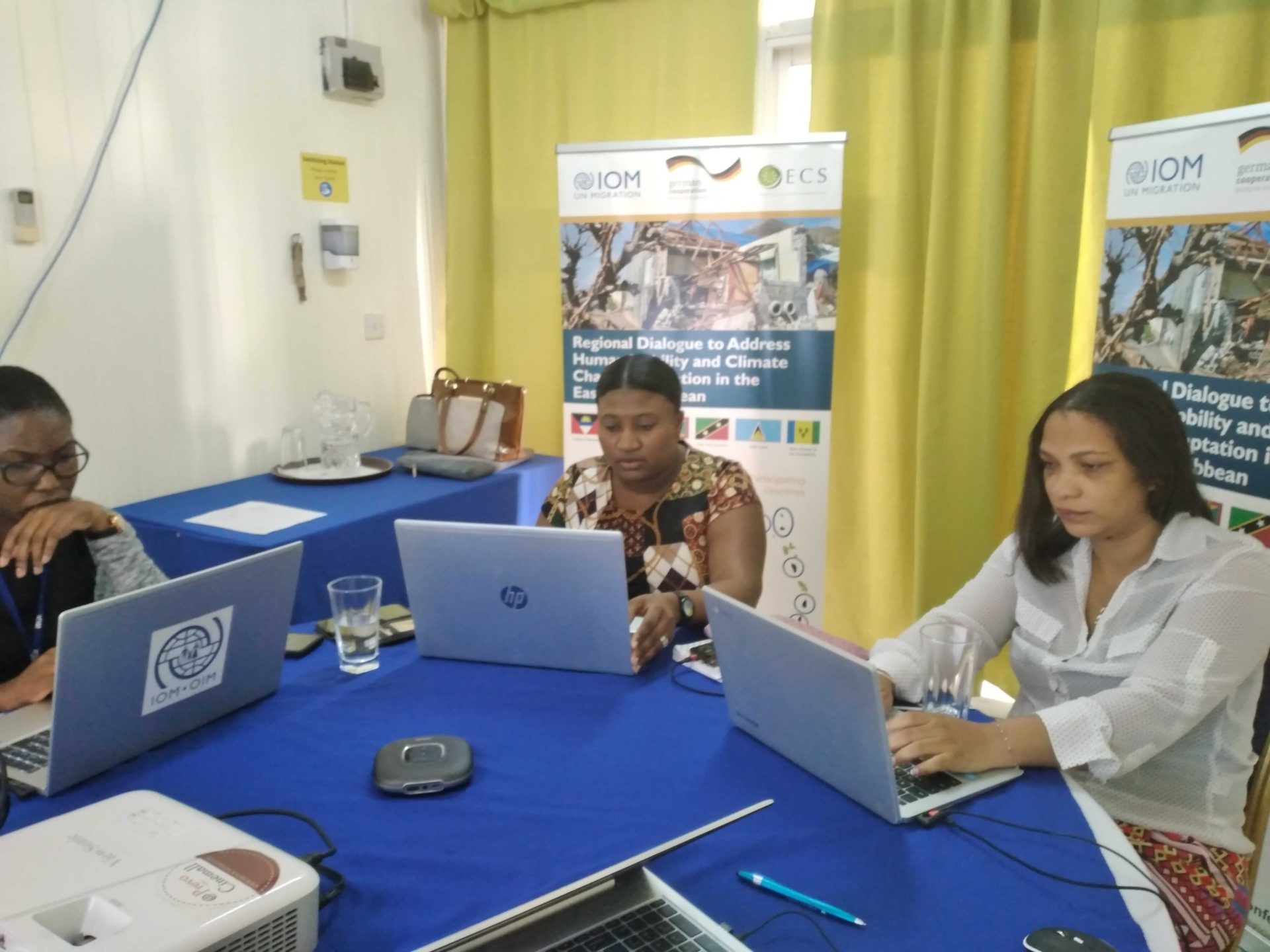
26 March 2021 – Since May 2020, the International Organization for Migration (IOM) in Dominica has been engaged in a “Regional Dialogue to Address Human Mobility and Climate Change Adaptation” project, in collaboration with the Organisation of Eastern Caribbean States (OECS) Commission and funded by the Federal Republic of Germany. The objective of the project is to enhance the governance of environmental migration in the Eastern Caribbean through improved evidence and regional cooperation.
Today, the project celebrated a milestone, having concluded national workshops in the six independent member states of the OECS, namely Antigua and Barbuda, Dominica, Grenada, Saint Kitts and Nevis, Saint Lucia, and Saint Vincent and the Grenadines. Key government stakeholders including the Departments of Statistics, Immigration, and Disaster Management in each country, participated in these workshops, to review their unique contexts regarding data on human mobility due to environmental factors and climate change. Project activities were forced to be held virtually for the most part, due to the impacts of COVID-19 in the region.
Regional Coordination Officer for the Caribbean and Chief of Mission of IOM Guyana, Robert Natiello, explained the role of IOM as the UN Migration Agency, and the relevance of this work to the IOM strategy. “This project aligns with the IOM Regional Strategy for Central and North America and the Caribbean, 2020-2024 in several areas: enhancing the capacity of governments to collect, analyse and use migration and internal displacement data for evidence-based policymaking; strengthening disaster preparedness, reducing the risk of displacement and responding to crises; and developing flexible and innovative mobility schemes based on national development plans, labour market needs and the impact of disasters, or for purposes of family reunification, among others.”
Dr. Clarence Henry, Senior Technical Officer in the Regional Integration Unit of the OECS Commission noted that the Commission recognizes that the OECS Regime for Freedom of Movement of Persons established under the Revised Treaty of Basseterre can be further strengthened. “The recent experience of Hurricanes Maria and Irma in 2017 demonstrated the utility of the regime – enabling the timely movement of our brothers and sisters in distress and their resettlement in neighbouring OECS Member States. It also facilitated the ease of movement of persons from unaffected Member States to support the rebuilding efforts. However, in the context of Environmental Migration, specifically movement due to natural disasters, we also appreciated the need to improve citizenship identification and the efficient capture of data.”
Pablo Escribano, Regional Migration, Environment and Climate Change Specialist at the IOM Regional Office explained that “Human mobility in contexts of climate change is often categorized in three broad groups: migration, displacement, and planned relocation. Examples of all these movements have been recorded in the Caribbean”. He went further to caution that “Better data and evidence is required for policymakers to prevent and address environmental migration. As countries are advancing new and ambitious climate action, environmental migration data represents a bottleneck that needs to be targeted for improved interventions at the national and regional levels.”
Dr. Andrea Milan, Lead – Migration Governance Data at IOM’s GMDAC noted that the OECS region is the first region globally to undertake this kind of research. He explained that the aim of the research activity was “to identify strengths, weaknesses and opportunities of data systems to enhance the availability of reliable data on environmental migration for informed planning and policy. The outcomes of the data assessment report will be used to help build capacities of national stakeholders on Migration Environment and Climate Change (MECC) data collection and management, including the creation of technical guidelines; and to develop regional guidelines and propose a regional road map to help build capacities of the countries in enhanced cooperation and better understanding, preventing and addressing human mobility.” The research will be published on all IOM’s global platforms including the Global Migration Data Portal (https://migrationdataportal.org)
Dr. Milan gave some insight into the outcomes of the national workshops, which helped the research team to move from some general ideas about what could be done to strengthen migration, environment and climate change date, to identifying feasible, actionable guidelines. According to him, common feedback that emerged across all countries included opportunities to adjust forms and templates to enhance migration, environment and climate change data not only among the most obvious actors (immigration or national statistical offices) but also in other ministries. Constraints of human and financial resources were a recurring issue, especially for new technologies/digital devices. Participants felt that more could be done, through better cooperation and harmonization, including by making the best out of already existing templates, for instance those produced by the Caribbean Disaster Emergency Management Agency (CDEMA).
Representatives of the six independent states all attested to the positive impact of the national workshops and recognized the importance of improving their collection and management of this data in their countries. The Eastern Caribbean islands have been feeling the effects of climate change, including increased frequency and severity of disasters, highlighting the need to integrate human mobility in climate change strategies, with some noting that Small Island Developing States (SIDS) like the OECS nations are on the frontline of climate change, and cannot afford a gradual approach to putting policies and appropriate measures for resilience in place. Participants also noted that the workshops had strengthened the working relationships between Disaster Management, Statistics, Immigration, and other departments in member states, demonstrating the multi-sectoral nature of the challenge to better collect and manage data. This 15-month project aims to address limitations in the availability of data and evidence required for countries to plan their interventions by enhancing the capacities of governments to collect, analyse and utilise data on human mobility and vulnerability derived from environmental change.
Head of Office of IOM Dominica, Natasha Greaves, gave some insight as to the next steps being pursued under the project, with the support of the Federal Republic of Germany. “Right now, my team is tailoring the capacity building sessions to cater to the information needs and other gaps identified in each country” she indicated. “We are going to deliver these sessions through hands-on support and cost-efficient solutions or other alternatives depending on the country’s situation. The goal is to start these sessions in April 2021.”
The Head of Office shared plans for a Regional Conference in June 2021. “In June, we plan on hosting a regional conference on human mobility in Dominica. The conference will cater to stakeholders in Antigua and Barbuda, Dominica, Grenada, St. Lucia, St. Kitts and Nevis and St. Vincent and the Grenadines. It will be an opportunity to identify best practices and we are calling on the policy makers, and trailblazers to make themselves available for the regional conference so we can actively work on designing a roadmap for enhanced cooperation on improving the governance of human mobility and climate change data collection and management in the Eastern Caribbean.” She thanked all the contributors and expressed confidence that the work would help to improve national and regional data on migration and development.






